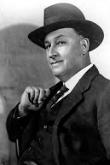Commissioned for the 1924 British Empire Exhibition, Australia Calls was a semi-documentary about Ernest Idiens, a successful English immigrant in Australia. (Idiens also toured England in 1923 talking about his successes.)
From a contemporary news report:
'Seldom has the screen given a more striking demonstration of its power to tell a convincing story than in a film, entitled 'Australia Calls,' which was exhibited in the cinema theatre at Australia House,' says The London Telegraph. 'In rather less than an hour the audience learned how Ernest Idiens, a young Staffordshire farm labourer, went to New South Wales 11 years ago with £30 for his whole fortune, and by dint of grit and hard work is the owner to-day of property worth £14,000. So grateful is Mr. Idiens for what his adopted country has done for him that he has had a film made of his experiences in order that others who are to-day situated as he was in 1912 may be induced to follow his example.
'Within two days after landing at Sydney the_young man—he was 25 years old at the time—was on his way up-country to take a job on a farm at 25/ a week, in addition to his board and lodging. He saved practically all his wages, going from one farm job to another until at the end of two years he was able to purchase four colts and break them in. Then he and his brother, who had also come out from England with an assisted passage, farmed a block of 280 acres on sharing terms with the proprietor. A year or two later they were in a position, thanks to a bank loan of £750, to lease approximately 2,000 acres at an annual rent of 3/ an acre, with the option of purchase at £4 10/ an acre.
'To-day Mr. Idiens owns property at Congera which is his own absolutely, worth, as has been stated, £14,000, though he is still quite a young man. Mr. Idiens, who was present at the exhibition of his film, declares that his case is by no means exceptional. Any young man, he says, it he works hard can do as well, and even a good deal better than he has done.'
Source:
'Making Good in Australia', The Register, 24 January 1924, p.13.
 1488336990370827231.png
1488336990370827231.png